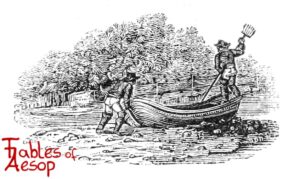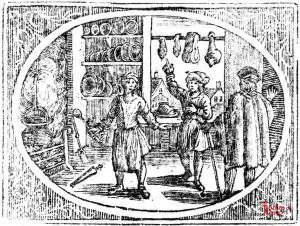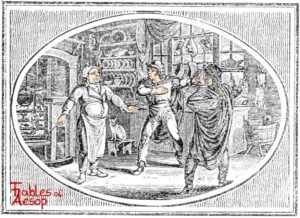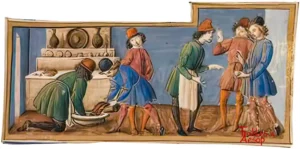Two men visited a Cook. The Cook noticed something missing. Both men swore they had not taken it, even though they did. God saw even if the Cook didn’t.
You can trick man but not God.

JBR Collection
Two Young Men went into a Cook’s shop, under pretence [sic] of buying meat. While the Cook’s back was turned, one of them snatched up a piece of beef, and gave it to his companion, who put it under his cloak. The Cook turning round again, missed the meat, and charged them with the theft. “I haven’t got it,” said he who had taken it. “I’ve taken none of your meat,” said he that had it. “Look here,” said the Cook, “which of you has stolen my meat, I can’t say; but of this I’m sure-between you both there’s a thief and a couple of rascals.”

Samuel Croxall
TWO young Men went into a Cook’s-shop, under pretence of buying meat; and while the Cook’s back was turned, one of them snatched up a piece of beef, and gave it to his companion, who presently clapt it under his cloak. The Cook, turning about again, and missing his beef, began to charge them with it; upon which he that first took it swore bitterly he had none of it. He that had it swore as heartily that he had taken up none of his meat. Why, look ye, gentlemen, says the Cook, I see your equivocation; and though I cannot tell which of you has taken my meat, I am sure between you both, there is a thief, and a couple of rascals.
THE APPLICATION
An honest man’s word is as good as his oath; and so is a rogue’s too; for he that will cheat and lye, why should he scruple to forswear himself? Is the latter more criminal than either of the former? An honest man needs no oath to oblige him; and a rogue only deceives you the more certainly by it; because you think you have tied him up, and he is sure you have not. In truth, it is not easy with the eye of reason, to discern that there is any good in shearing at all. We need not scruple to take an honest man’s bare asseveration; and we shall do wrong if we believe a rogue, though he swears by the most solemn oaths that can be invented. There are, besides, a sort of people who are rogues, and yet do not know that they are such; who, when they have taken an oath, make a scrup!e of breaking it; but rack their invention to evade it by some equivocation or other; by which, if they can but satisfy their acquaintance, and serve their own scheme, they think all is well, and never once consider the black and heinous guilt which must attend such a behaviour. They solemnly call the Supreme Being to witness; to what? To a sham, an evasion, a lye. Thus these unthinking prevaricating wretches, at the same time that they believe there is a God, act as if there were none; or, what is worse, dare affront him in the highest degree! They, who by swearing would clear themselves of a crime of which they are really guilty, need not be at much pains about wording their oath; for, express themselves how they will, they are sure to be forsworn.

Thomas Bewick (The Young Men and The Cook)
Two Young Men went into a Cook’s shop, under pretence of buying some meat; and while the Cook’s back was turned, one of them snatched up a piece of beef, and gave it to his companion, who clapt it under his cloak. The Cook turning about, and missing his beef, began to charge them with it: upon which he that first took it swore bitterly he had none of it. He that had it, swore as heartily that he had not taken it. Why, look ye, gentlemen, says the Cook, I see your equivocation; and though I cannot tell which of you has taken my meat, I am sure between you there is a thief.
APPLICATION
This fable shews how little reliance can be placed on either the word or the oath of those who, like the thieves in the cook’s shop, have neither honour nor honesty. An honest man’s word is as good as his oath; and so is a rogue’s too: for he that will cheat and lie, will not scruple to forswear himself. The former needs no oath to bind him; and the latter, though he swear in the most solemn manner that can be invented, only deceives you the more certainly, as he who scruples not to steal, will never regard the heinous guilt of calling upon the Supreme Being to witness his atrocity. It is no less wicked to quibble and evade the truth, than it is to deny it altogether, for the falsehood consists in what we wish the hearer to believe, not in the literal import of what we say. Men who habituate themselves to this species of deceit, will soon be ready to go the length of any perjury. Early to impress the mind with the unspeakable worth of truth, is of the utmost importance. It is sacred, and no man can say in the face of the world, that it ought not to prevail. No discussions can injure its cause–it emanates from heaven–it is an attribute of omnipotence, and is therefore eternal.


L’Estrange version
Two young fellows slipt into a cooks shop, and while the master was busie at his work, one of them stole a piece of flesh, and convey’d it to the other. The master missed it immediately, and challeng’d them with the theft. He that took it, swore he had none on’t. And he that had it, swore as desperately that he did not take it. The cook reflecting upon the conceit: Well, my masters, (says he) these frauds and fallacies may pass upon men; but there’s an eye above that sees thorough them.
Moral
There’s no putting of tricks upon an all-seeing power; as if he that made our hearts and knows every nook, and corner of them, could not see thorough the childish fallacy of a double-meaning.

Gherardo Image from 1480

Fures et Coquus
Duo adolescentes apud coquum aliquid sese simulant esse empturos. Coquo alias res agente, carnem alter surripit; dat socio ut sub veste occultet. Coquus, surreptam sibi carnis partem ut novit, furti utrumque coepit accusare. Qui carnem sustulerat, per Iovem iurabat se non habere; qui vero habebat, iurabat se non abstulisse. “Me quidem,” inquit coquus, “fur latet; non autem eum latebit per quem iuravistis.”
Perry #066


